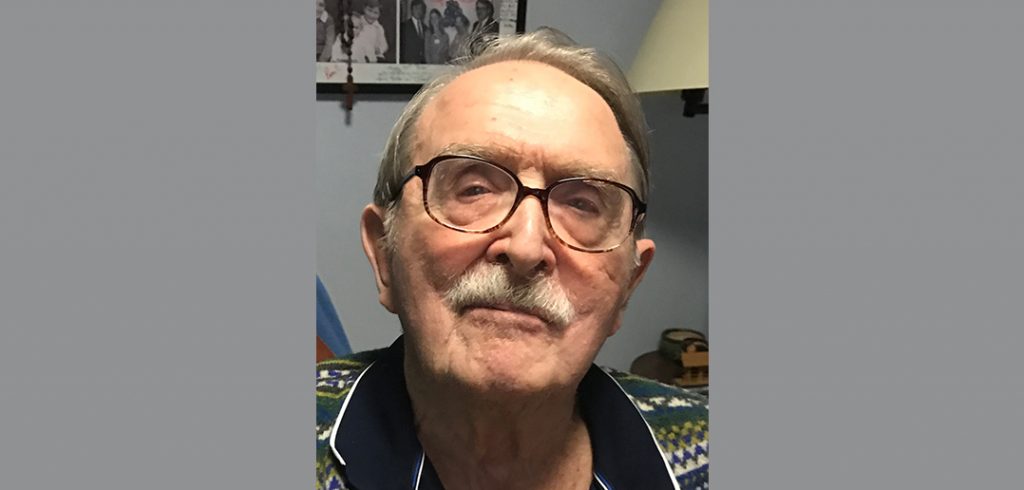Peter Pavel Remec, Ph.D., a former chair of Fordham’s political science department who taught at the University for 50 years, died at the Mary Manning Walsh Nursing Home in Manhattan on Nov. 2. He was 95.
A Slovenian native remembered for his cosmopolitan ways and collegiality, Remec taught courses in international politics with a specialty in international law and international organization. He started at Fordham in 1954 and continued teaching until his retirement in 2004.
Political science Professor John Entelis, Ph.D., who was hired by Remec in 1970, recalled him as “a popular teacher” whose effectiveness stemmed not only from his deep qualifications in his field but also his personality.
“The old standard statement about a scholar and a gentleman, that was Peter,” said Entelis. “He was chair for at least six years, and he did an excellent job of being able to not just manage the faculty but get close to them. He would invite us to his home for occasions where he would have dinners and [there would be]an opportunity to get to know everyone on a personal basis.”
Entelis said that his daughter took Remec’s class years later and it “really encouraged her to continue on [to Fordham Law].”
Remec supported many Fordham students on their professional paths over the years, but his own journey had not been an easy one. He was born on June 28, 1925, in Ljubljana, Slovenia, to Vladimir and Helena (Pollak) Remec. In 1945, at the end of World War II, he and his family fled from the newly communist Slovenia to Graz, Austria, with what they could carry. While there, he earned a Dr. Iuris (Doctor of Laws) and Dr. Rerum Politicarum from the University of Graz before immigrating to the United States on the U.S. Army Transporter General C.C. Ballou in 1949. He was forever grateful to President Harry Truman for authorizing the use of empty returning troopships to carry immigrants, said his son, Marko Remec, and in gratitude remained a faithful Democrat for the rest of his life.
Remec and his family settled in Chicago. While there, he paid a courtesy visit to professor Hans Morgenthau at the University of Chicago, whose work he had cited extensively in his doctoral essays. After learning that Remec was working as a cake icer at Marshall Fields, Morganthau offered him the chance to study for a doctorate. When Remec told him he had no money, Morgenthau managed to secure him a scholarship on the spot, and Remec earned his Ph.D. in international relations.
In 1953 he married Majda Vračko, whom he had first met in high school in Ljubljana and then again when they found themselves in the same refugee camp in Graz. The couple settled in New York in 1954 and raised four children in Scarsdale—Peter, Alenka, Marko, and Tomaz.
Annette M. McDermott, S.S.J., FCRH ’80, recalled being advised by Remec as a young political science major in the mid-1970s. She’d come to Fordham from Massachusetts with dreams of interning at the United Nations, but internships weren’t common at the time. Remec told her if she could get someone at the U.N. to go for it, he’d allow for 8 credits of independent study.
“I remember he used to wear this tweed cap,” said Sister McDermott, now dean of religion and spiritual life at Mount Holyoke College. “He grabbed the cap, and in his robust accent he said, ‘If you get this, I will eat my hat.'”
Not only did she appreciate his sense of humor, she said, but also the fact that he took her seriously. Fordham had only been coed for a couple of years, and there were hardly any women in her political science classes. When she was offered a technical adviser position with a U.N. organization, she went back to tell Remec.
“He looked at me with a twinkle in his eyes, and he grabbed the cap and started shoving it his mouth,” she said, laughing at the memory. “He said, ‘You have your 8 credits.’” Sister McDermott went on to serve on UNICEF’s volunteer board, earn a master’s in public policy, and do doctoral work in political science.
“He just opened me up to the understanding of what an effective international organization was and what it was not,” she said.
Remec earned several international academic honors. In 1961, he received the Diplome of the Academy of International Law at the Hague, graduating cum laude. In 1967 he was a Fulbright grantee as guest professor to the University of Rajasthani in Jaipur, India. In 1976, he was a Fulbright grantee to Pakistan. Both trips focused on his passion for the law of the seas, specifically the Indus River water treaties.
A devout Catholic, Remec was appointed as an observer to the U.N. Mission of the Holy See in 1974. For his service, on May 27, 1983, Pope John Paul II named him Knight Commander of the Order of St. Gregory the Great. His son, Marko Remec, said that he liked to point out that one of the privileges of this knighthood was that he was permitted to ride a horse into the Vatican.
A skilled woodworker, Remec made most of the furniture in his New York home. He learned the craft in his father’s furniture factory in Slovenia. He was also gifted in languages; in addition to Slovenian, he was fluent in Serbo-Croatian, German, English, and Latin, his son said, and was “passable” in Italian and French.
Remec was preceded in death by his parents, a sister, two brothers, and his wife. He is survived by his four children, two brothers Andrej and Matija, and seven grandchildren. A burial service was held at the Gate of Heaven Cemetery in Hawthorne, New York, on Nov. 10. The family asks that donations be sent in his name to St. Cyril’s Church at 62 St. Marks Place, New York, NY 10003.
This obituary was written in part by Peter Remec’s family.
Photo courtesy of the family.

